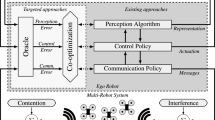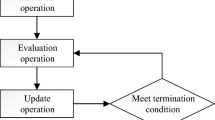Abstract
Robots working collaboratively can share observations with others to improve team performance, but communication bandwidth is limited. Recognizing this, an agent must decide which observations to communicate to best serve the team. Accurately estimating the value of a single communication is expensive; finding an optimal combination of observations to put in the message is intractable. In this paper, we present OCBC, an algorithm for Optimizing Communication under Bandwidth Constraints. OCBC uses forward simulation to evaluate communications and applies a bandit-based combinatorial optimization algorithm to select what to include in a message. We evaluate OCBC’s performance in a simulated multi-robot navigation task. We show that OCBC achieves better task performance than a state-of-the-art method while communicating up to an order of magnitude less.




Similar content being viewed by others
References
Becker, R., Carlin, A., Lesser, V., & Zilberstein, S. (2009). Analyzing myopic approaches for multi-agent communication. Computational Intelligence, 25(1), 31–50.
Becker, R., Zilberstein, S., Lesser, V., & Goldman, C. V. (2004). Solving transition independent decentralized Markov decision processes. Journal of Artificial Intelligence Research, 22, 423–455.
Best, G., Cliff, O. M., Patten, T., Mettu, R. R., & Fitch, R. (2018a). Dec-MCTS: Decentralized planning for multi-robot active perception. International Journal of Robotics Research, 38(2–3), 316–337.
Best, G., Forrai, M., Mettu, R., & Fitch, R. (2018b). Planning-aware communication for decentralised multi-robot coordination. In Proceedings of the IEEE international conference on robotics and automation.
Bianchi, G. (1998). IEEE 802.11-saturation throughput analysis. IEEE Communications Letters, 2(12), 318–320.
Carlin, A., & Zilberstein, S. (2009a). Myopic and non-myopic communication under partial observability. In Proceedings of the IEEE/WIC/ACM international joint conference on web intelligence and intelligent agent technology (pp. 331–338). IEEE.
Carlin, A., & Zilberstein, S. (2009b). Value of communication in decentralized POMDPs. In Proceedings of the AAMAS workshop on multi-agent sequential decision making in uncertain domains (pp. 16–21).
Chen, S., Lin, T., King, I., Lyu, M. R., & Chen, W. (2014). Combinatorial pure exploration of multi-armed bandits. In Proceedings of the advances in neural information processing systems conference (pp. 379–387).
Foerster, J., Assael, Y., de Freitas, N., & Whiteson, S. (2016). Learning to communicate with deep multi-agent reinforcement learning. In Proceedings of the advances in neural information processing systems conference (pp. 2137–2145).
Giamou, M., Khosoussi, K., & How, J. P. (2018). Talk resource-efficiently to me: Optimal communication planning for distributed slam front-ends. In Proceedings of the IEEE international conference on robotics and automation.
Goldman, C., & Zilberstein, S. (2004). Decentralized control of cooperative systems: Categorization and complexity analysis. Journal of Artificial Intelligence Research, 22, 143–174.
Hiertz, G. R., Max, S., Rui, Z., Denteneer, D., & Berlemann, L. (2007). Principles of IEEE 802.11s. In Proceedings of the international conference on computer communications and networks.
Koenig, S., & Likhachev, M. (2005). Fast replanning for navigation in unknown terrain. IEEE Transactions on Robotics, 21(3), 354–363.
Pynadath, D. V., & Tambe, M. (2002). The communicative multiagent team decision problem: Analyzing teamwork theories and models. Journal of Artificial Intelligence Research, 16, 389–423.
Roth, M. (2007). Execution-time communication decisions for coordination of multi-agent teams. PhD thesis, Carnegie Mellon University.
Roth, M., Simmons, R., & Veloso, M. (2005). Reasoning about joint beliefs for execution-time communication decisions. In Proceedings of the international conference on autonomous agents and multi-agent systems.
Roth, M., Simmons, R., & Veloso, M. (2006). What to communicate? execution-time decision in multi-agent pomdps. In Distributed autonomous robotic systems 7 (pp. 177–186). Tokyo: Springer
Shrader, B., & Ephremides, A. (2007). Random access broadcast: Stability and throughput analysis. IEEE Transactions on Information Theory, 53(8), 2915–2921.
Sukhbaatar, S., Szlam, A., & Fergus, R. (2016). Learning multiagent communication with backpropagation. In Proceedings of the advances in neural information processing systems conference (pp. 2244–2252).
Unhelkar, V., & Shah, J. (2016). ConTaCT: Deciding to communicate during time-critical collaborative tasks in unknown, deterministic domains. In Proceedings of the AAAI national conference on artificial intelligence (pp. 2544–2550).
Williamson, S., Gerding, E., & Jennings, N. (2008). A principled information valuation for communications during multi-agent coordination. In Proceedings of the AAMAS workshop on multi-agent sequential decision making in uncertain domains.
Williamson, S., Gerding, E., & Jennings, N. (2009). Reward shaping for valuing communications during multi-agent coordination. In Proceedings of the international conference on autonomous agents and multi-agent systems.
Wu, F., Zilberstein, S., & Chen, X. (2011). Online planning for multi-agent systems with bounded communication. Artificial Intelligence, 175(2), 487–511.
Acknowledgements
This material is based upon work supported by the National Science Foundation (NSF) Graduate Research Fellowship Program under Grant No. DGE 1256260, as well as NSF Grant Nos. CCF 1442773 and NRI 1830615. Any opinions, findings, and conclusions or recommendations expressed in this material are those of the authors and do not necessarily reflect the views of the National Science Foundation.
Author information
Authors and Affiliations
Corresponding author
Additional information
Publisher's Note
Springer Nature remains neutral with regard to jurisdictional claims in published maps and institutional affiliations.
This is one of the several papers published in Autonomous Robots comprising Special Issue on Robot Communication Challenges: Real-World Problems, Systems, and Methods.
Rights and permissions
About this article
Cite this article
Marcotte, R.J., Wang, X., Mehta, D. et al. Optimizing multi-robot communication under bandwidth constraints. Auton Robot 44, 43–55 (2020). https://doi.org/10.1007/s10514-019-09849-0
Received:
Accepted:
Published:
Issue Date:
DOI: https://doi.org/10.1007/s10514-019-09849-0




